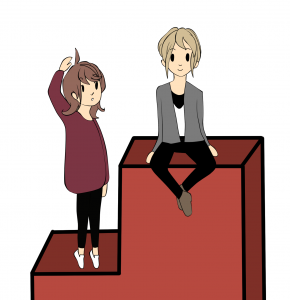
NOWADAYS, WE’RE constantly told that “no one does you better than you,” and that we need to stop complaining and be completely content with who we are. “Don’t compare yourself to others,” they say. Although we try to promote egalitarianism as an ideal, rankings are an inherent part of society wherever you go. No two persons are alike, and by the same token, some people are better in some respects than others. Comparing ourselves to others, especially our betters, not only brings us into reality, but also allows us to pursue the best version of ourselves.
Of course, I don’t encourage finding someone and transforming yourself into a carbon copy of that person, but rather using the accomplishments of others to motivate yourself towards greater goals. For example, moving from a middle-class neighborhood to an upper-class one may make your accomplishments seem lackluster. But rather than be intimidated by the accomplishments of those around you, you should use them to fuel your desire to succeed. Use your environment and the people around you to figure out what your next goal should be in life.
In the case that you feel superior to those around you because of what accomplishments you have received, you need to realize that you can’t just stop working hard. There may be someone performing at a higher level than you, and when you see that you realize you can’t slack off. Comparisons aren’t just for motivating, they can also be humbling.
What would an example of a beneficial comparison look like?
Imagine yourself as a student who just received a 94 on your test. Initially, you might be pleased with yourself, content to rest on your 94. But after asking around, you find that many of your peers have scored higher. Perhaps because of this, you may be motivated to study more to reach the same level as your peers, or if you’re a competitive student, score even higher. On top of enticing you to perform better, the comparison might also serve as a humbling factor, showing you that there is room for improvement.
Comparisons can be negative, though. They can inflate egos via comparisons to those beneath you, or make you regret your lack of achievement through comparisons to your better peers. But both effects are counterable. The ego inflation can be solved by making sure the comparisons are always upwards. By making sure that the comparisons are to those above you, you are inspired to aim higher and progress, rather than remain stagnant or content. Then there is the possibility of feeling down after seeing the accomplishments of more successful peers. This is more of an attitude problem than one with comparisons. Rather than dwell on your own supposed inferiority, use the accomplishments of your peers as a goal to reach and maybe even surpass.
Comparisons aren’t as immoral as people make them out to be; they’re about living in reality. Remaining in a mindset of either an inflated ego or self-pity is illogical. Such an existence bars the doors to self-improvement. When you see someone who knows what they want to do and how to achieve it, it should motivate you to improve your own situation.































